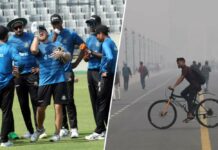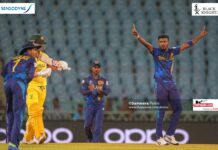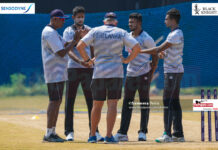Seven finals, five titles. Australia capped off another successful home summer with the ICC Cricket World Cup 2015 in their own backyard, becoming the second team to do so after India, banishing the ignominy of not qualifying for the semi-finals when they hosted the tournament the last time in 1992.
An Australia-New Zealand final created history and repeated some as well, but in the end it was a team led by Michael Clarke, who had been stunned at the start of the summer when they lost one of their own, and yet willed themselves to go the distance throughout an emotional four months.
Like many Australian legends of the past, Clarke signed off from ODI cricket with a cup in his hand and after making a significant contribution in the final, and passes on the baton to a young player whose rise throughout the summer has been phenomenal. Newer players have seamlessly merged into the system which means that Australia will be tough to beat even in four years’ time when the party travels to England in 2019. And despite a slow start to their campaign, the team rose to its vaunted standards at the business end and made it count.
Record in the WC – 9 matches, Won 7, Lost 1, Abandoned 1
High point
Nothing succeeds like success and Australia embody that belief. Their win-at-all-costs attitude sometimes rubs oppositions the wrong way but here they were clinical. While winning the coveted trophy would be the highest point, Australia had several individual highs. They scored the highest World Cup total – 417/6 – against Afghanistan at Perth, Mitchell Starc finished the tournament as Man of the Series, Glenn Maxwell’s brutal innings against Sri Lanka, and Clarke’s winning farewell from ODIs.
Low point
Despite a rousing victory to kick off their campaign that also began at the MCG, Australia did stumble for a brief while where they didn’t feature in a game for two weeks after a washout against Bangladesh in Brisbane. Their biggest grudge match arrived, their only game in New Zealand, and they bungled it when they were bowled out for 151.
Another scare arrived in the game against Sri Lanka, where despite scoring 376 they were put under severe pressure while defending it. A hamstring injury to Dinesh Chandimal, who had blazed his way to 52 off 24 balls, took the momentum out of Sri Lanka’s chase and they finished 64 runs short. Australia’s decision to play spinner Xavier Doherty didn’t pay off, and he never played another game in the tournament. Their spin ranks look bare, but they managed to mask that deficiency well.
Captaincy verdict
Any questions on Australia’s captaincy prior to the World Cup was put to bed, first by stand-in skipper George Bailey, and then by Michael Clarke. While Clarke’s return after a lengthy lay-off ended in a defeat to New Zealand, Australia’s picked up the pieces and lifted their game for the knock-outs. That Clarke had missed a majority of the Australian summer to back and hamstring injuries didn’t take the focus away from him. Clarke’s moving tributes to their late team-mate Phil Hughes endeared him to the Australian public and besides his astute leadership, he came up with important knocks in crucial games. There were calls for him to call it quits from the ODI game which he did after the final, but he left an indelible impression with his captaincy, especially while handling a brilliant bowling attack. With the World Cup, Clarke retired from ODI cricket as one of Australia’s best, going by the illustrious band of players he ended up joining.
Most valuable player
While the 2015 World Cup saw staggering totals throughout the length of the tournament, the bowlers enjoyed their moment in the sun, and Australia’s triumph was thanks largely to the effort from their pace bowlers, led by Man of the Series Mitchell Starc. Australia benefited from a potent opening bowling line-up led by Starc, who finished as the highest wicket-taker of the competition with 22, and that wasn’t even the best part about his bowling. Swinging the ball at 150kmph up front and reverse-swinging with the old, Starc averaged 10.18 and was the only bowler who went under four runs an over. His first-over dismissal of Brendon McCullum practically decided the final.
Major disappointment
Consistency of some of their key players was the reason behind Australia’s fifth title triumph, but the same could not be said of veteran allrounder Shane Watson, who despite a pair of important knocks against Sri Lanka and Pakistan, was largely off-colour during the tournament. Watson’s role in the team has often been questioned and after he was dropped for the game against Afghanistan, many wondered if he would even return. Watson’s returns with the bat improved thereafter, but with the ball he continued to leak runs and was unable to take wickets. At number five Watson regained his batting form but whether he would be in the scheme of things for Australia over the next couple of years remains to be seen.
Despite a stirring hundred in the opening game against England and an important knock against India in the semi-final, Aaron Finch didn’t quite live up to his explosive billing in the World Cup. A misfiring Finch put Australia under pressure at the start of their innings, and had it not been for Steven Smith’s stunning run of form, they could have struggled up front.
Verdict
A momentous summer ending with a World Cup triumph was the cherry on the cake for Australia, who went from strength to strength in order to regain the title they had surrendered in 2011. Australia remained unbeaten at home ever since the arrival of India for the Test series, and became unbeatable once the knockouts arrived. Michael Clarke was given a winning send-off and despite the retirement of their influential captain, the Australian limited-overs team remains in safe hands thanks to the emergence of Steven Smith and the rise of Mitchell Starc. With a new breed of players leaving their mark in 2015, the team remains in excellent shape going into the next edition in 2019.

















